
The Conspirators
Michael Douglas — Nicholas Van Orton
Sean Penn — Conrad
Deborah Kara Unger — Christine
The Masterminds
Directed By: David Fincher
Written By:
John Brancato,
Michael Ferris
Running Time: 2hr 9min
Rated R
Memorable Quotes
[Nicholas van Orton loses a shoe when climbing a fire-escape ladder]
Nicholas: There goes a thousand dollars.
Christine: Your shoes cost a thousand dollars?
Nicholas: That one did.
***
Daniel Schorr: Discovering the object of the game *is* the object of the game.
***
Nicholas: I don't care about the money. I'm pulling back the curtain. I want to meet the wizard.
***
Conrad: This is for you.
Nicholas: You shouldn't have.
Conrad: What do you get for the man who has... everything?
Nicholas: [reading card] "Consumer Recreation Services." Well, I do have golf clubs.
Conrad: Call that number.
Nicholas: Why?
Conrad: Make your life... fun.
Nicholas: Fun.
Conrad: You know what that is... uh, you've seen other people have it.
***
New Member Ted: This was the best one *ever*!
Jim Feingold: [shakes Nicholas's hand] You know, thank God you jumped, because if you didn't, I was supposed to throw you off!
***
Christine: You got a shower in your office?
Nicholas: Yeah.
Christine: You an athlete or something?
Nicholas: No, I'm an investment banker.
***
CoverUps.com Rating: 3 UFOs
![]()
![]()
![]()
By the CoverUps.com staff
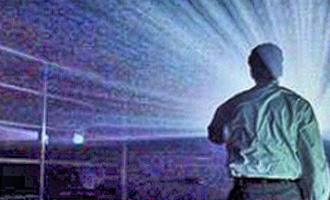
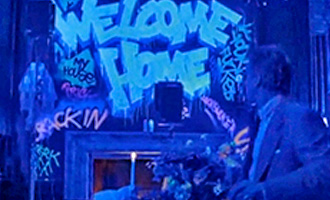
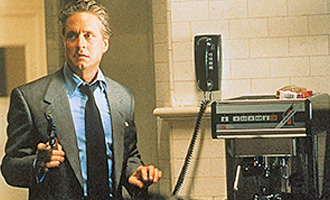

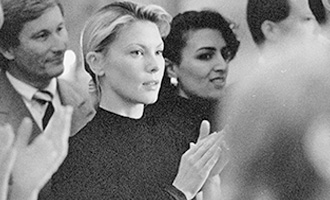
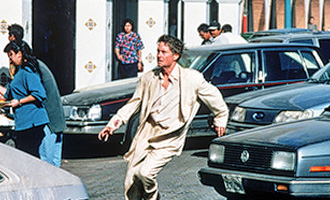
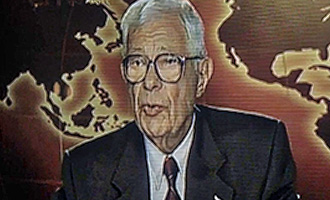
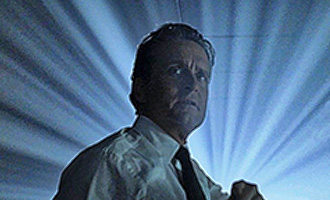
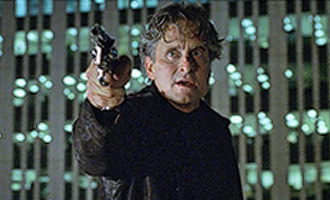
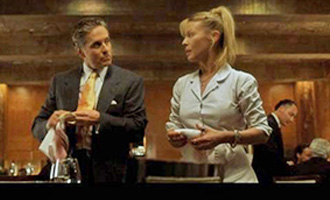
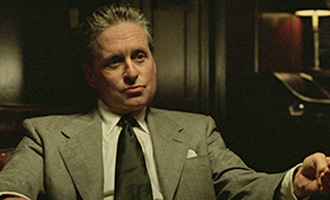
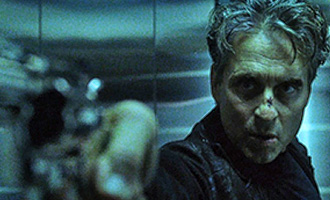
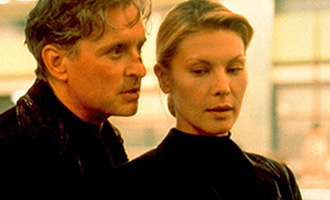
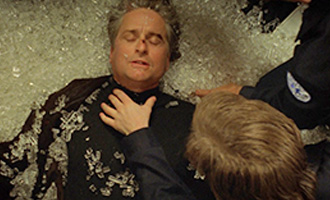
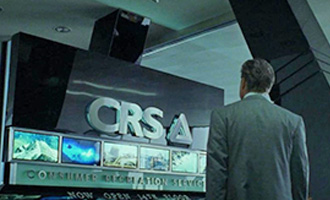
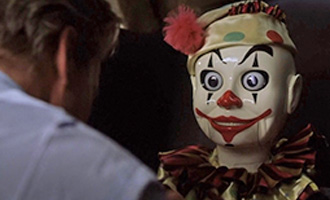
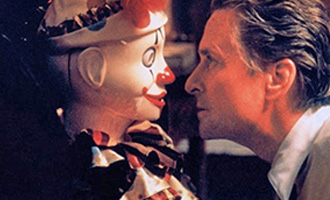
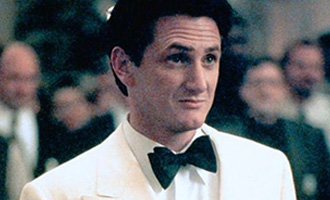
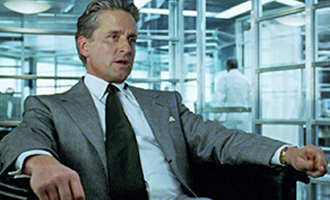
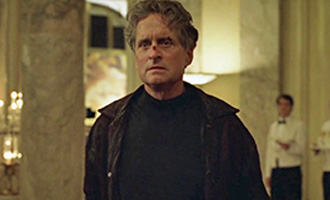
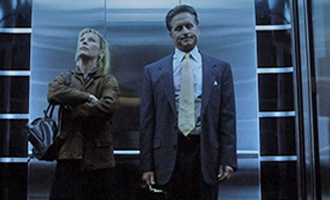
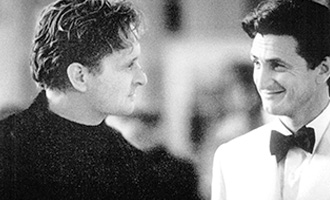
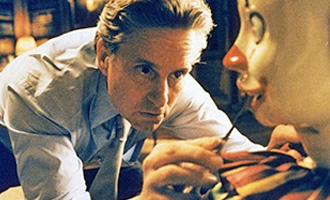
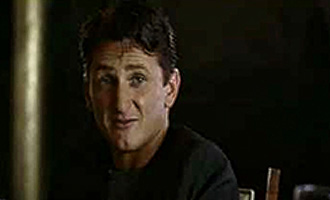
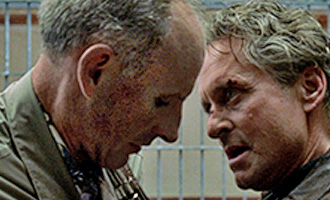
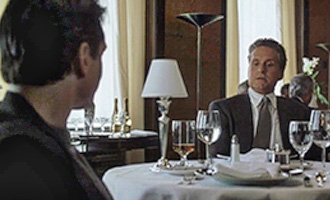
In the opening scenes of "The Game", we encounter Michael Douglas as a rich and isolated man in obsessive control of his affluent and empty life. By the time you've seen it all you may conclude that the central point is about recovering one's humility and humanity through trial and tribulation — but maybe that's just a trick. In point of fact, "The Game" is something akin to a control freak's worst nightmare.
The Douglas character, Nicholas Van Orton, is surrounded and served by employees who are paralyzed by fear and his inflexible demands on them. "I have an Elizabeth on line three," says one secretary, and then a moment later clarifies, "Your wife, sir." "I know," he answers coldly. It's easy to imagine that if the second secretary hadn't jumped in, Van Orton would've asked, "Elizabeth who?" Such is the lot of his underlings. And of Van Orton. Of course it is his ex-wife; at age 48, Van Orton lives by himself in a huge mansion where his father committed suicide, also when he was 48. His birthday evening is a cheeseburger on a silver tray, in front of a TV, watching CNN.
Then Van Orton's younger brother Conrad (Sean Penn) visits him a visit and hands him a birthday present: "The Game," which is described innocuously as a "sort of an experiential Book of the Month Club." Run by a murky outfit known as Consumer Recreation Services, the Game never explicitly specifies its rules or objectives, but Van Orton quickly finds himself in CRS's tentacles, and his orderly life falls apart with alarming speed. "It will make your life fun again," brother Conrad promises, but Nicholas looks on warily as a corporate functionary walks him through the signup.
Soon everything becomes hellish. It starts small. His pen leaks. His briefcase won't open. Someone spills wine on him in a restaurant. Then he's trapped in an elevator. The chaos snowballs. Next thing he's blackmailed, his bank accounts are looted, he wanders the streets like a homeless man, he's trapped inside a sinking cab, he's left for dead in Mexico.
A moment's reflection on the plot details is all you need for the movie to fall apart — but that's not the point. The events have a nightmarish logic to them.
In the face of this sadistic avalanche of targeted mayhem, Van Orton is detached and coldly contemptuous: he knows the angles (he thinks), foresees the dangers, and can guess all the possible scenarios up ahead. But he keeps guessing wrong. Even the few people he hopes he can trust (including a waitress played by Deborah Kara Unger) could be double agents. There's even the possibility that the Game is a front for a conspiracy to take his millions. Michael Douglas, who excels at playing men of power (i.e. Gordon Gekko in "Wall Street" or POTUS in "The American President") is reduced to a disheveled, desperate man on the run (ala the laid-off engineer in "Falling Down").
"The Game," written by John Brancato and Michael Ferris, was David Fincher's first film after "Se7en," and it projects the same menacing sense of events controlled by invisible manipulators. This time, though, there's another element: Van Orton is being torn down and put back together like the subject of some all-powerful EST program. And it's unclear whether the Game is an out-and-out fraud, or just spinning out of control.
The movie's thriller elements are given an added sheen by the wickedly glib dialogue. When Van Orton's brother asks, "Don't you think of me anymore?" he shoots back, "Not since family week at rehab." When his ex-wife asks if he had a nice birthday, he retorts, "Does Rose Kennedy have a black dress?" The film's dark color gamut, its bias for shadows, is reminiscent of "Se7en" and for that matter, "Alien 3". The big screen hides secrets and details in dark corners. Like "Se7en", the plotting is smart and serpentine, and though we think we know the arc of the story (egomaniac reduced to humility and self-awareness), it doesn't happen in anything like a linear, predictable way. In the heat of the story, at its scariest, there's a real danger that the Game isn't just an ego-reduction program, but a death plot.
Douglas is the right man for this role. He can play smart, cold, and angry. He never overdoes the arc of his character's inner change. One of the really refreshing things about "The Game" is how it stays true to its paranoid point of view right up to what looks like the very end — and then beyond it, so that when the real ending rolls in, it's not about payoff and release so much as one last ironic twist of the knife.
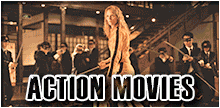



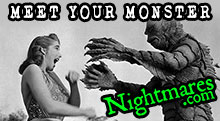

















BACK TO: Movie CoverUps Index * Specials * Main Index
Copyright 1999 -The Web Network Inc All Rights Reserved
HauntedHouses.com * MurderMysteries.com * ReceptionMansion.com